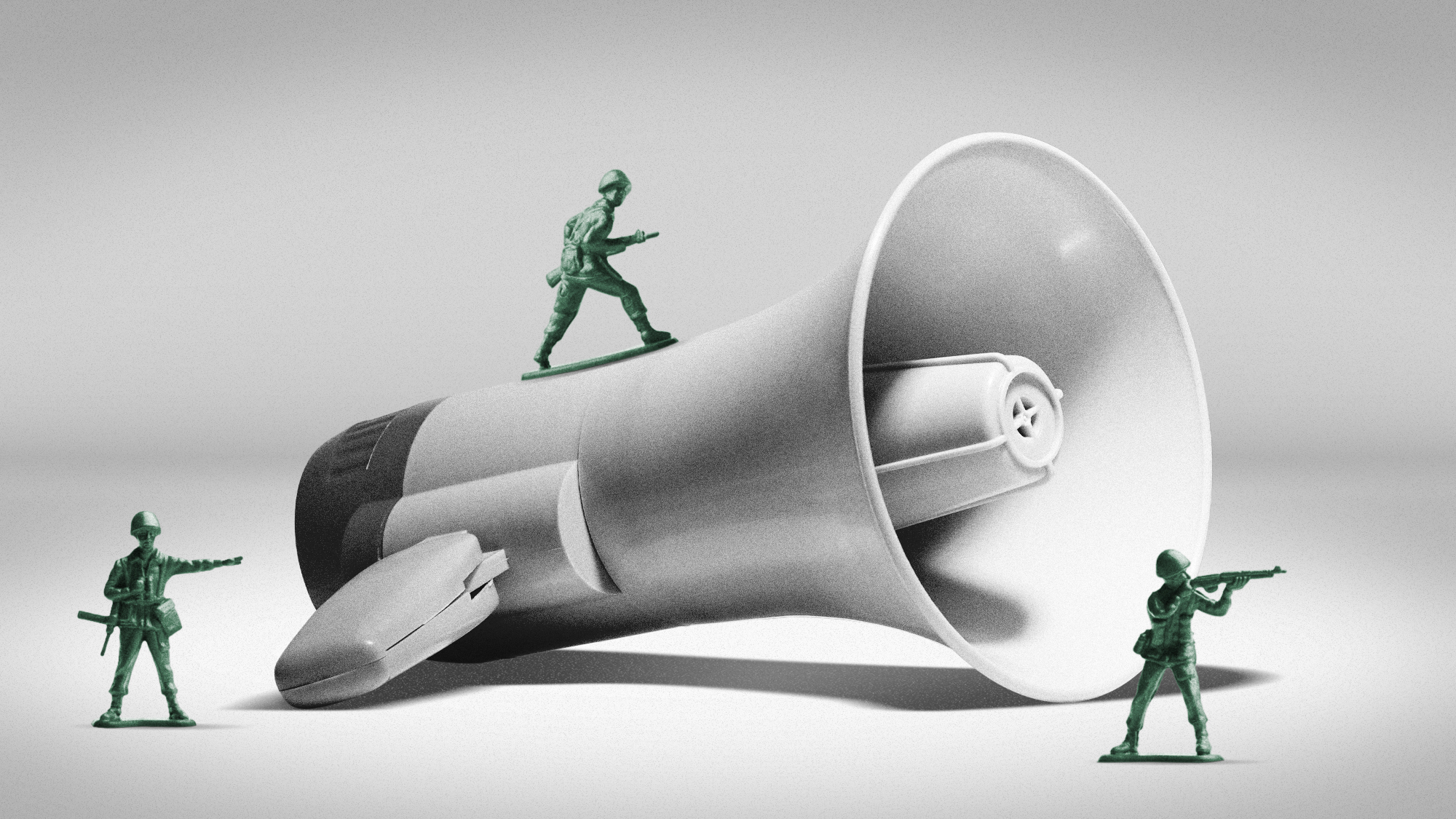The PR war between Israel and Hamas
How are public relations changing — and contributing to — the conflict?


A free daily email with the biggest news stories of the day – and the best features from TheWeek.com
You are now subscribed
Your newsletter sign-up was successful
As Israel and Hamas extend their deadly war, it doesn't appear that an easy end is in sight. Recent evidence emerged that Hamas had planned a second, even deadlier attack against Israel in an effort to provoke a larger-scale war, while Israeli Prime Minister Benjamin Netanyahu has repeatedly pushed back against calls for a cease-fire.
As the world continues taking sides, both Israel and Hamas have tried to leverage the power of media to create their respective narratives about the war. With the fight dragging on, the two sides have both been accused of spreading disinformation and propaganda through the use of PR. Public relations pushes aren't new to war — the U.S. military has had entire teams dedicated to PR for decades, and a global relations study published in 1991 concluded that "public relations today is an essential part of modern warfare."
And while PR in wartime may be a longstanding affair, the advent of social media has exacerbated it and allowed conflicting groups to tell their own stories — for better or worse. How are Israel and Hamas using public relations during the war, and what does it mean for the future of the Middle East conflict?
The Week
Escape your echo chamber. Get the facts behind the news, plus analysis from multiple perspectives.

Sign up for The Week's Free Newsletters
From our morning news briefing to a weekly Good News Newsletter, get the best of The Week delivered directly to your inbox.
From our morning news briefing to a weekly Good News Newsletter, get the best of The Week delivered directly to your inbox.
What is Israel's PR strategy?
Israel has continually attempted to paint a picture of barbaric Hamas insurgents, particularly in the days immediately following the initial terrorist attack on Oct. 7. On social media platforms including X, formerly Twitter, "a photo with a bloody dead baby whose face is blurred" circulated for days as part of a paid message from the "Israeli Foreign Affairs Ministry," Politico reported.
Images such as these are part of Israel's "sweeping social media campaign in key Western countries to drum up support for its military response against the group," Politico added. Its main strategy is to promote "dozens of ads containing brutal and emotional imagery of the deadly militant violence in Israel," according to the outlet. This is part of a growing trend of "governments around the world moving aggressively online in order to shape their image, especially during times of crisis."
These types of tactics have been seen in many wars since the dawn of the internet, such as in Ukraine, where social media influencers have used their clout to keep the country in the headlines for the past year and a half. But this strategy — using examples of violence to try and shift the tide of public opinion — has become especially commonplace in Israel's current fight.
This was notably seen during a recent video released by the chief spokesperson of the Israel Defense Forces (IDF), Daniel Hagari. The video shows Hagari walking reporters through the basement of a now-abandoned hospital in Gaza that was allegedly used as a base of operations by Hamas. Hagari is seen showing off large caches of weapons, including assault rifles and grenades, that were reportedly used by Hamas insurgents. Hagari can additionally be heard telling the reporters that the IDF had "found signs that indicate that Hamas held hostages here," and that the group "conducted its war against Israelis from this hospital."
A free daily email with the biggest news stories of the day – and the best features from TheWeek.com
However, controversy over Israel's approach remains. Some outlets have called this type of PR simply another form of propaganda, given that thousands of Palestinians have died in Gaza as a result of Israeli bombing. Israel began "waging a massive disinformation campaign to justify the horrors that would soon unfold," Hamid Dabashi wrote for Middle East Eye. Dabashi also accused the media of "[carpet-bombing] the news cycle with pro-Israel propaganda" because Western media has largely been in support of Israel. A recent video released by Israeli media "smacked of high school theater," Marc Owen Jones opined for The Daily Beast. He added that Israel's PR relied on a "series of increasingly desperate attempts to try and justify the growing number of civilians killed in Gaza in response to the horrific Hamas attack."
What is Hamas' PR strategy?
Hamas "believes in using existing political institutions to garner power and authority" while at the same time "establishing a social service infrastructure and conducting missionary work to gain popular support," according to Devorah Margolin, a fellow at the Washington Institute for Near East Policy. Since the group took control of Gaza in 2007, Hamas has attempted to portray itself as "a legitimate political actor and representative of Palestinians in Gaza."
The group, which has been designated as a terrorist organization by many foreign entities, "even operated social media accounts to engage with the general public," Margolin reported. Hamas' social media also included an official account on X which in 2015 posted, "Hamas respects human rights; that is part of our ideology and dogma."
It seems that not everybody agrees with this sentiment, however. "Hamas' military leaders have mainly spouted propaganda," Adam Rasgon and David D. Kirkpatrick reported for The New Yorker. This reportedly includes the downplaying of the group's own violence — one of Hamas' political leaders, Abu Marzouk, told The New Yorker that "Hamas fighters hadn't executed civilians or committed atrocities." Marzouk instead claimed that these actions had been carried out "by Palestinian militants and civilians who had followed Hamas fighters" into Israel.
Interviews like these are part of the wider use of news outlets and social media by Hamas. This is particularly prevalent on the messaging app Telegram, where Hamas shares messages "designed to strengthen supporters' resolve, stir up anti-Israel rage in neighboring countries, defend its militants' brutality and induce sympathy to the plight of Gaza," The Washington Post reported.
Similarly to the controversy over Israel's PR push, some people have taken issue with Hamas attempting to present itself in this manner. The Post highlighted one video from Hamas in which "camouflaged men hefting assault rifles push a crying baby in a stroller" with the caption, "Hamas fighters showing compassion for children." However, the Post noted, Hamas has also used Telegram "to publish video monologues from political and military leaders, rally international supporters to take up arms and threaten to broadcast hostage executions."
What's the end game?
Public relations in war didn't start with this conflict, and won't end with this conflict either. However, the PR strategies employed by Israel and Hamas have reportedly allowed false information to thrive, especially as technology and social media advance. "Disinformation warfare is advancing as rapidly as military technology and media techniques," Haaretz reported. As the line between PR and disinformation continues to blur, "agents of disinformation are utilizing the latest technology, such as generative artificial intelligence (AI) and deepfakes, and spread it widely on social media to outmaneuver both governments and people," the outlet added.
This trend of manipulation — particularly among social media and images — has "taken a central role in disinformation campaigns," a professor of disinformation at Clemson University, told Haaretz. And while both Israel and Hamas may continue to use public relations to paint each other as the worse combatant, the war has "produced horrific images, but also misinformation and disinformation about actions on both sides," according to Valerie Wirtschafte, a foreign policy fellow at the Brookings Institution.
As such, the most effective part of both of these PR pushes could be that they have laid out "how social media sells you the illusion of reality," CNN reported — whether that reality is accurate or not.
Justin Klawans has worked as a staff writer at The Week since 2022. He began his career covering local news before joining Newsweek as a breaking news reporter, where he wrote about politics, national and global affairs, business, crime, sports, film, television and other news. Justin has also freelanced for outlets including Collider and United Press International.
-
 The ‘ravenous’ demand for Cornish minerals
The ‘ravenous’ demand for Cornish mineralsUnder the Radar Growing need for critical minerals to power tech has intensified ‘appetite’ for lithium, which could be a ‘huge boon’ for local economy
-
 Why are election experts taking Trump’s midterm threats seriously?
Why are election experts taking Trump’s midterm threats seriously?IN THE SPOTLIGHT As the president muses about polling place deployments and a centralized electoral system aimed at one-party control, lawmakers are taking this administration at its word
-
 ‘Restaurateurs have become millionaires’
‘Restaurateurs have become millionaires’Instant Opinion Opinion, comment and editorials of the day
-
 ‘Bad Bunny’s music feels inclusive and exclusive at the same time’
‘Bad Bunny’s music feels inclusive and exclusive at the same time’Instant Opinion Opinion, comment and editorials of the day
-
 Is the Gaza peace plan destined to fail?
Is the Gaza peace plan destined to fail?Today’s Big Question Since the ceasefire agreement in October, the situation in Gaza is still ‘precarious’, with the path to peace facing ‘many obstacles’
-
 A running list of everything Donald Trump’s administration, including the president, has said about his health
A running list of everything Donald Trump’s administration, including the president, has said about his healthIn Depth Some in the White House have claimed Trump has near-superhuman abilities
-
 ‘Human trafficking isn’t something that happens “somewhere else”’
‘Human trafficking isn’t something that happens “somewhere else”’Instant Opinion Opinion, comment and editorials of the day
-
 How Iran protest death tolls have been politicised
How Iran protest death tolls have been politicisedIn the Spotlight Regime blames killing of ‘several thousand’ people on foreign actors and uses videos of bodies as ‘psychological warfare’ to scare protesters
-
 ‘The science is clear’
‘The science is clear’Instant Opinion Opinion, comment and editorials of the day
-
 The Board of Peace: Donald Trump’s ‘alternative to the UN’
The Board of Peace: Donald Trump’s ‘alternative to the UN’The Explainer Body set up to oversee reconstruction of Gaza could have broader mandate to mediate other conflicts and create a ‘US-dominated alternative to the UN’
-
 Israel’s E1 zone in the West Bank: the death of the two-state solution?
Israel’s E1 zone in the West Bank: the death of the two-state solution?The Explainer Controversial new settlement in occupied territories makes future Palestinian state unviable, critics claim
